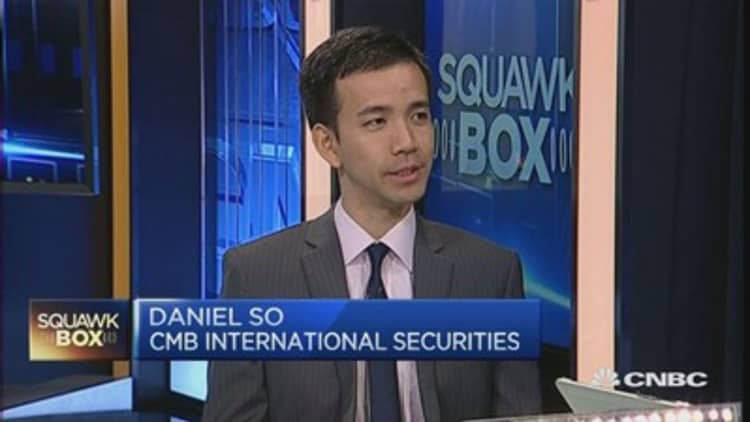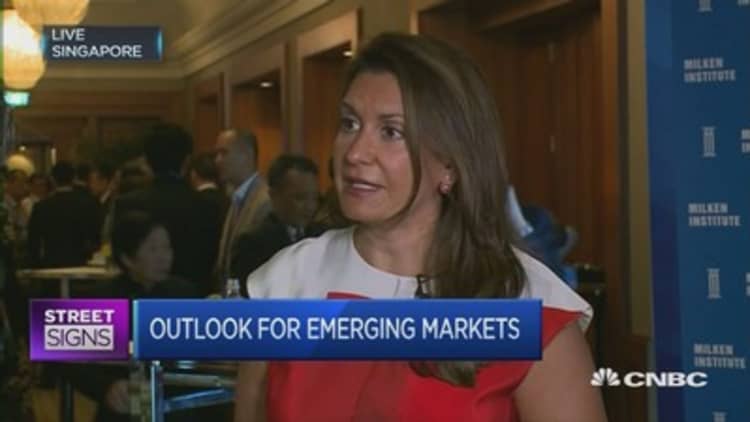Asian shares advanced on Friday after the Federal Reserve decided to hold off on its first rate hike in nearly a decade, but Japan's Nikkei 225 tumbled on the back of renewed strength in the yen.
The world's most influential central bank cited concerns over the global economy and financial market volatility among the factors that played a role in keeping interest rates near zero.
"The outlook abroad appears to have become less certain," Yellen said at a news conference after a two-day policy-setting meeting. "In light of the heightened uncertainty abroad ... the committee judged it appropriate to wait."
"In the grand scheme of things, the decision by the Fed to leave rates unchanged is indicative that the global economy and the U.S. economy is performing worse than previously projected," IG's market analyst Angus Nicholson wrote in a note.
Wall Street indexes gave up a 1-percent rally to end mostly lower overnight. The blue-chip and the slipped 0.4 and 0.3 percent respectively, while the Nasdaq Composite inched up 0.1 percent.
Nikkei loses 2%
The Nikkei index at the Tokyo Stock Exchange and the broader Topix index were among the hardest-hit in Asia, down 2 percent ahead of an extended weekend. Markets in Japan will be shuttered until next Wednesday.
With dollar-yen ticking down at 119.70, exporters traded on the back foot. Blue-chip names Toyota Motor and Canon eased nearly 2 percent each, while Panasonic slumped 2.2 percent.
Financials endured particularly heavy selling, with Sumitomo Mitsui Financial Group and Mitsubishi UFJ Financial Group tanking more than 3 percent each. Nomura Holdings also receded 2.9 percent.
Meanwhile, the Bank of Japan (BOJ) policymakers agreed that emerging economies had suffered from weak growth but were likely to improve from a somewhat long-term perspective, minutes from the central bank's policy meeting held earlier this week showed. The BOJ kept monetary policy steady on Tuesday, in line with expectations.
Read MoreAs it happened: Asia responds to Fed inaction
China markets higher
China's Shanghai Composite index edged up 0.4 percent, thanks to strength among developers after data from the National Bureau of Statistics showed average new home prices in China rose for the fourth month in a row in August. However for the week, the Shanghai bourse is down 3.2 percent.
Gemdale led gains in the sector with a rise of 1.4 percent, while China Vanke and Poly Real Estate notched up 0.2 and 0.5 percent respectively.
Heavyweight component PetroChina dropped 0.8 percent, while banking stocks turned lower in the afternoon session with Industrial and Commercial Bank of China (ICBC) and Bank of China widening losses to 1.3 and 0.8 percent respectively.
Among other indexes, the benchmark CSI300 Index and the smaller Shenzhen Composite closed up 0.4 and 1.2 percent respectively.
In Hong Kong, property names which are extremely sensitive to the interest rate environment outperformed the broader Hang Seng index which inched up 0.3 percent. CK Property surged 4.7 percent, while Henderson Land Development and Sun Hung Kai Properties charged up more than 3 percent each.
According to CMB International Securities' Daniel So, the Fed's decision to hold fire for now will likely give Hong Kong markets a "short-term boost."
"It will give Hong Kong stocks a short-term boost because it helps [to] limit the housing bubble... I believe investors can now [go] overweight interest rate-sensitive stocks like Hong Kong property," the Hong Kong-based strategist told CNBC Asia's "Squawk Box."

ASX gains 0.5%
Advances in the shares of gold producers and banks helped Australia's index to brush off an uninspiring lead from Wall Street.
Newcrest Mining rallied 7 percent as the price of gold firmed near a two-week high in early Asian trade. Evolution Mining and Kingsgate Consolidated climbed 1.6 and 0.7 percent respectively.
By contrast, oil-related counters such as Santos, Oil Search and Woodside Petroleum declined between 0.9 and 5 percent, in tandem with weaker oil prices.
Major lenders recouped losses to head back into positive territory; Westpac was the biggest winner with a rise of 1.3 percent, while National Australia Bank, Australia and New Zealand Banking and Commonwealth Bank of Australia moved up between 0.3 and 0.8 percent.
Read MoreSydney takes crowdfunding to clawsome new levels
In the currency space, the Australian dollar hit a three-week high of $0.7277 against the dollar following the policy announcement, but has since retreated back to $0.7187. In a testimony before parliament on Friday, Reserve Bank of Australia (RBA) Governor Glenn Stevens said he is not especially concerned by the prospect of higher U.S. interest rates and expects a rate hike before the end of 2015.
"For Australia, the Fed's decision is a mixed blessing. On the one hand it would have been better to see the Fed able to raise interest rates as it would signal greater confidence in global growth and ongoing downwards pressure on the Aussie dollar," Shane Oliver, head of investment strategy and chief economist at AMP Capital, said.
"Ultimately though the downtrend in the Aussie dollar is likely to resume as the Fed is still likely to hike at some point, the RBA is likely to remain under pressure to cut and commodity prices remain weak so there is no change to my view that the Aussie dollar will fall to around $0.60 in the next 12 months or so," Oliver added in his note.

Kospi jumps 1%
South Korea's Kospi index clawed back early losses to finish at a more than one-month peak.
Among the top performers, consumer discretionary names such as AmorePacific and LG Household & Healthcare soared 5.2 and 2.3 percent respectively.
Pharmaceuticals also forged higher, with the sub-index advancing 5.7 percent.
On the other hand, banking shares tracked the region-wide sluggishness; Shinhan Financial Group and Woori Bank plunged 4 and 2 percent respectively.
Read MoreDeveloper's towering ambitions for Thailand
Rest of Asia
Elsewhere in the region, Taiwanese shares closed up 0.2 percent at its highest level since August 11.
In Southeast Asia, Philippines' PSE Composite Index closed 0.1 percent higher, Indonesia's Jakarta Composite was up 0.04 percent at the close and Singapore's Straits Times index finished the day 0.56 percent lower. Malaysian shares underperformed and fell 0.72 percent at the close.
In the currency space, the Indonesian rupiah slipped against the U.S. dollar to hover at a fresh low since July 1998.
According to the country's chief economics minister, the Indonesian currency will remain under pressure as the Fed delays its plan to raise interest rates. "It is a dilemma for us and also other countries. But if there's no hike like this, pressures and speculation (on the rupiah) will continue," Darmin Nasution, Indonesia's coordinating minister of economics, told Reuters.

